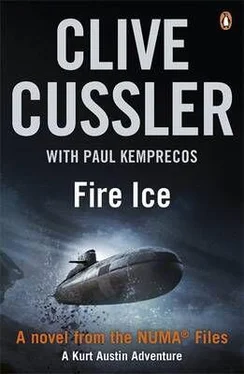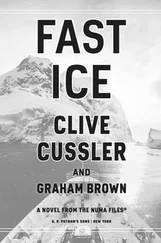Reed saw that Jenkins was carrying a briefcase instead of f a white paper bag, studied Jenkins's weathered and tanned face and then took in the workshirt and cap.
"Guess you're not from the cafeteria," he said sadly.
"My name is Leroy Jenkins. I'm sorry to bother you. I got off at the wrong floor and sort of wandered in here." He looked around. "What is this place?"
"NUMA's computer center," said the ponytailed man. He was boyish, clean-shaven face with a narrow nose and gray eyes. "Max can answer just about any question you throw her way."
"Max?"
Yaeger gestured to the screen. "I'm Hiram Yaeger. This is Hank Reed. That lovely lady up there is a holographic illusion. Her voice is a feminine version of my own. I used my own face originally, but I got tired of looking at myself and dreamed up a pretty woman, my own wife."
Max smiled. "Thank you for the compliment, Hiram."
"You're welcome. Max is smart as well as beautiful. Ask her any question you'd like. Max, this is Mr. Jenkins."
The image smiled and said, "Pleased to meet you, Mr. Jenkins."
I've been in the wilds of Maine for too long, Jenkins thought. "Actually, it's Dr. Jenkins. I'm an oceanologist." He drew a breath in. "I'm afraid my questions are rather complicated. They've got to do with methane hydrates."
Yaeger and Reed looked at each other, then at Jenkins.
Max said, with a sigh that was more than human, "Is it really necessary to repeat myself?"
"Nothing personal, Dr. Jenkins. Max has been working on the same subject for the last hour or so," Yaeger said. He punched out the cafeteria number on the phone and turned to Jenkins. "We'd like you to join us for lunch."
Reed leaned forward. "I recommend the pastrami. It's an existential experience."
THE SANDWICH WAS as tasty as promised. Jenkins realized that with the exception of the bag of peanuts he'd had on the plane, his stomach was empty. He took a swig of root beer to wash his lunch down and looked at the other men, who were waiting expectantly.
"This is going to sound crazy," he said.
"Crazy is our middle name," Yaeger said. Reed nodded his head in agreement. Although the two men looked like an overaged hippie and a munchkin with a Don King hairdo, they appeared very bright. More important, they were interested in hearing his story.
"Don't say I didn't warn you," he said. "Okay," he began. "I retired from teaching college a few years ago and bought a lobster boat in Rocky Point, my hometown."
"Aha! A fisherman," Reed said. "I knew it."
Jenkins smiled, then resumed. "You probably read about the tsunami that hit there not too long ago."
"Yes, it was an awful tragedy," Reed said.
"It could have been worse." Jenkins explained his role in warning the town.
"Lucky you were there," Yaeger said. "Something puzzles me, though. First time I've heard of something like that happening. New England isn't at the edge of a major fault like Japan or California."
"The only comparable precedent I found was the big wave caused by the Grand Banks earthquake in 1929. The quake's epicenter was under the ocean on the continental slope south of Newfoundland and east of Nova Scotia. The tremor was felt in Canada and New England, but the source was two hundred and fifty miles from the nearest land, so damage was negligible. Roads were blocked by landslides, chimneys broken and dishes rattled. Otherwise, the shock had little impact. The biggest effect was on the sea."
"In what way?" Reed said.
"There were two ships near the epicenter. The vibrations were so violent they thought they'd lost a propeller or hit an uncharted wreck or sandbar. The quake created a great wave that struck the south coast of Newfoundland three hours later, running up into rivers and inlets in the little fishing villages along sixty miles of coastline. The worst damage was at a wedge-shaped bay on the Burin Peninsula. The tsunami rose to thirty feet at the apex of the bay, damaged docks and buildings and killed more than twenty-five people."
"Very similar to what happened at Rocky Point."
"Almost a mirror image. The fatality and injury rate was lower in my town, thank goodness. There was another important similarity. Both waves seem to have been caused by huge underwater slides. There was no doubt that an earthquake caused the Grand Banks disaster. The oceanic cables were broken in dozens of places." He paused. "Here's where they were different: The Rocky Point slide seems to have been caused without a quake."
"Interesting. Were there any seismic readings?"
"I checked with the Weston Observatory outside of Boston. The Grand Banks quake had a magnitude of 7.2. So we know something of that magnitude will cause a tsunami. The Rocky Point readings were more muddled." He paused. "There was a shock, but it didn't fit the classic pattern for a quake."
"Let me see if I'm clear on this. Are you really saying the Rocky Point slump was not from an earthquake?"
"I think that can be fairly well established. What I can't say is what actually caused the landslide." Yaeger looked over the tops of his granny glasses. "Which came first, the chicken or the egg?"
"Something like that. I had read about the methane- hydrate deposits found off the continental slope and wondered if instability in those pockets of gas could have caused the slump."
"It's certainly possible," Reed said. "There are huge pockets of the stuff off both coasts. We've found major deposits off of Oregon and New Jersey, for instance. You've heard of the Blake Ridge?"
"Sure. It's an undersea promontory a couple of hundred miles southeast of the U.S."
"Off the North Carolina coast, to be exact. The ridge is loaded with methane hydrate. Some people think the ridge is a 'pressure cooker.' Surveys have found craters pockmarking the ocean floor where the stuff has melted and seeped out, releasing methane gas."
Jenkins scratched his head. "I'm sorry to say I don't know a lot about hydrates. I try to keep up through the professional journals since leaving the university, but what with the lobstering and so on, I never seem to have enough time."
"It's a comparatively new area. You're familiar with chemical composition of hydrate?"
"It's made up of natural gas molecules trapped in ice."
"That's right. Someone dubbed it 'fire ice.' It was discovered in the nineteenth century, but our knowledge has been pretty sketchy. The first natural deposits were under the permafrost in Siberia and North America -they called it marsh gas – then in the 1970s, a couple of scientists from Columbia University found pockets under the seafloor when they were doing seismological studies at the Blake Ridge. In the 1980s, the Woods Hole submersible Alvin found stone undersea chimneys formed by escaping methane. I was on the first big survey back in the mid-1990s. That's when we discovered the deposits in the Blake Ridge. They're only a fraction of what's out there. The potential is vast.”
"Where are the major deposits?"
"Mostly along the lower slopes of the world's continental shelves, where the seabed drops from four hundred feet or so into the abyss several miles deep. There are major pockets off both U.S. coasts. As I said, you can find them in Costa Rica, Japan, India, and under the arctic permafrost. The sheer size of the deposits is astounding. The most recent estimates are ten thousand gigatons. That's double the total amount of all known reserves of coal, oil and natural gas."
Jenkins let out a low whistle. "Waiting there to be tapped when we suck our petroleum reserves dry."
"I wish it were so easy," Reed said with a sigh. "A few technical problems have to be ironed out before extraction is practical."
"Is it dangerous to drill?"
“The first time a ship drilled into a pocket was in 1970. Nothing happened, but drillers were afraid for years afterward that they'd get blown out of the water. Eventually, a few experimental bores showed that research drilling was safe. Getting hydrates to the surface to heat your home or run your SUV is another question. The environment is extremely hostile in the deep water where hydrates are found, and the stuff simply fizzes when we bring it up. The deposits may be another few hundred feet below the seafloor."
Читать дальше












